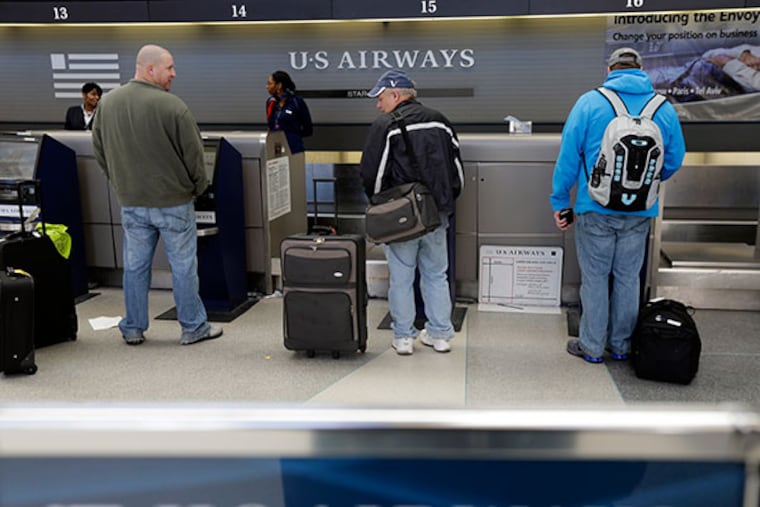Why PHL ranks just 18th for air passengers
Philadelphia International Airport is the 18th busiest U.S. airport in passenger traffic, with 30.5 million air travelers last year. The nation's busiest passenger airport, Atlanta, handled 94.4 million fliers, while 66.8 million traversed Chicago O'Hare, according to Airports Council International.

Philadelphia International Airport is the 18th busiest U.S. airport in passenger traffic, with 30.5 million air travelers last year.
The nation's busiest passenger airport, Atlanta, handled 94.4 million fliers, while 66.8 million traversed Chicago O'Hare, according to Airports Council International.
Among airports with the fastest passenger growth, Philadelphia was No. 25 among the top 50. Passenger traffic here was up 1 percent.
How does the nation's sixth-largest metro area by population come in No. 18 in passengers?
Because that tells only one part of the story. In total aircraft operations - takeoffs and landings - Philadelphia airport ranked 10th in North America and 15th in the world, based on 2013 data from the airports council, an industry group.
About 60 percent of flights at Philadelphia International are express or commuter operations under the US Airways Express banner, primarily in Terminal F, said Philadelphia airport CEO Mark Gale.
Those planes are smaller: 50-, 70- and 90-seat aircraft. Airports with more passengers have a larger percentage of narrow-body and wide-body airplanes that carry 140 to 320 passengers, Gale said.
"We are considered a very busy airport in aircraft takeoffs and landings," he said, "because we have a lot of smaller airplanes coming in and out."
With the recent arrivals of Virgin America, Alaska, Spirit, JetBlue, and Qatar Airways, Philadelphia has not lost passengers, as have some other airports: Baltimore, Orlando, St. Louis, Atlanta, Denver, Indianapolis, Pittsburgh, Kansas City, Washington Dulles, Oakland, Cincinnati, and Milwaukee.
With the recent merger of US Airways and American Airlines, Gale said, "we expect to see some additional benefit from that."
Philadelphia's modest air-passenger growth also reflects the pullback by Southwest Airlines from a peak of 71 daily nonstops to 20 cities in 2008 to 34 weekday departures to 11 cities now.
In August, Southwest will end year-round nonstop flights from Philadelphia to Fort Lauderdale, Fla.
"Southwest is a massive domestic airline. Whatever they do impacts an airport overall, especially in small and midsize airports, where they are the whole story," said Seth Kaplan, managing partner of Airline Weekly, an industry publication.
Southwest arrived in Philadelphia to great fanfare in 2004, when US Airways was in bankruptcy for the second time and faced an uncertain future. US Airways competed aggressively, matched Southwest's fares, and retained many corporate travelers who preferred US Airways' upgrades and frequent-flier program.
Charlotte is the eighth-busiest passenger airport, with 43.4 million annual travelers and 5 percent passenger growth. Charlotte is US Airways' largest hub, with 629 daily flights, compared to 486 planned this summer in Philadelphia, which is US Airways international gateway.
"Air-traffic growth generally tracks regional economic growth, and Charlotte, over the years, has been a faster-growing local economy," Kaplan said. "It's a hub serving the Southeastern United States, a part of the country that's faster growing.
"It also helps that Charlotte is an extraordinarily low-cost airport," he said. "US Airways, now American, likes operating there because it's an extraordinarily cheap place for an airport."
Philadelphia works well for local traffic, "people who want to visit Philadelphia," Kaplan said, "but you also have the long-haul network out of there."
In contrast, American's hub at New York John F. Kennedy Airport "is not an airport where domestic travelers want to fly," Kaplan said, noting that New York-bound travelers prefer LaGuardia Airport. "But you can't catch a long-haul flight there.
"Philadelphia is a better mix - more like Newark, N.J., an airport where both short-haul flights work in their own right - because people actually want to go to that airport - but also the long-haul flights. Philadelphia just works."
215-854-2831